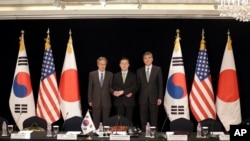High ranking diplomatic envoys from the U.S., South Korea, and Japan met in Seoul Wednesday to discuss how to respond to North Korea’s continued efforts to develop its nuclear program. U.S. allies in the region want to increase pressure on Pyongyang but also maintain support from China and Russia to make Korea a nuclear free peninsula.
After meeting with South Korean Special Representative Hwang Joon-kook, and Japanese foreign ministry envoy Junichi Ihara, U.S. Special Representative for North Korea Sung Kim voiced concerns over the North’s recent claims that it successfully tested a submarine launched missile and built a miniaturized nuclear warhead small enough to be mounted on a missile.
“I don’t want to comment on intelligence matters but I think whatever that may have been, it is of great concern to us that the North Koreans are continuing to pursue such capabilities. I think the intention is clear. We should be concerned,” said Kim.
North Korea’s claims have not been independently verified and many analysts say Pyongyang is still years away from deploying these new weapon systems.
Still, they do indicate that North Korea is moving steadily to develop the capability to strike the U.S. mainland or anywhere in the world with nuclear weapons, in defiance of United Nations imposed restrictions and despite international sanctions.
U.S. Secretary of State John Kerry recently said that the U.S. and its allies were not even close to resuming negotiations with Pyongyang and the other regional players Seoul, Washington, Tokyo, Beijing and Moscow. The six party talks about dismantling the North’s nuclear program in return for economic assistance and security guarantees have been on hold since 2008.
On Wednesday the envoys from the U.S., South Korea and Japan agreed that the only way forward is to increase pressure on North Korea through greater enforcement of existing sanctions and possibly imposing further restrictions.
South Korean Special Representative Hwang Joon-kook warned the North that its “diplomatic and economic isolation will deepen” if it stays on its current course.
Japan’s foreign ministry envoy Junichi Ihara said during the trilateral talks there was a shared “sense of urgency" to deal with the growing North Korean threat.
Ambassador Kim said it is important that Russia and China also continue to support whatever approach they decide to take. He said he will make that point clear when he meets Thursday with Chinese Special Representative Wu Dawei in Beijing.
“I expect to have full consultations with Ambassador Wu Dawei tomorrow on how the Chinese may engage the North Koreans to bring the North Koreans to some credible and authentic negotiations,” said Kim.
Secretary Kerry said Kim Jong Un has rebuffed overtures from China and Russia. Both countries supported U.N. imposed sanctions against North Korea after it conducted its third nuclear test in 2013.
But Beijing in particular has been reluctant to exert further pressure on Pyongyang out of concern that it might increase instability and the potential for conflict in the region.
However China is reportedly growing increasingly alarmed over Kim Jong Un’s intransigence and has, according to Secretary Kerry, indicated a new willingness to explore new punitive measures against Pyongyang.
The Chinese Defense Ministry also released a report this week covering a number of national security concerns. The report said, "The Korean Peninsula and Northeast Asia are shrouded in instability and uncertainty."
Robert Kelly, an international relations professor at Pusan National University in South Korea is not optimistic that Kim Jong Un can be persuaded or compelled to give up his nuclear ambitions. He said the possibilities for peaceful resolution are diminishing while the chances of either an arms race, or military action, be it a preventive strike or full on conflict are increasing.
“How does this end in a good way? I mean I’m not necessarily saying we are going to war next week but how does this, where is the off ramp? How does this de-escalate? Because I just don’t see the North de-escalating at all,” said Kelly.
In addition to apprehension over North Korea’s nuclear program, there are also increasing concerns about instability inside North Korea’s leadership.
According to South Korea’s National Intelligence Service, Kim Jong Un has executed numerous senior officials since he took power in 2011. In April, Defense Minister Hyong Yong Chol was reportedly executed or purged, for insubordination.









